Protecting Research Participants: Ethics in Quantitative Studies
VerifiedAdded on 2019/12/28
|5
|1285
|36
Report
AI Summary
This report critically reflects upon the ethical considerations within quantitative research, emphasizing the paramount importance of participant protection. It addresses the necessity of safeguarding participants from potential risks, including physical harm, psychological distress, and privacy breaches, by adhering to principles of justice, respect, and beneficence. The report identifies vulnerable populations, such as children, institutionalized individuals, and those with mental disorders, highlighting their increased susceptibility to harm. It further explores the potential risks associated with research participation, including discomfort, physical complications, side effects, and emotional distress. The report defines research ethics, emphasizing ethical and moral principles that guide researchers in distinguishing right from wrong and protecting human participants. It examines the relationship between law, ethics, and morality, underscoring the role of ethics in providing judgment, morality in shaping societal values, and law in maintaining social order. Finally, the report outlines the ethical processes within the UK, emphasizing commitment, consciousness, and competency, and how these processes protect research participants, ensuring confidentiality and safety.
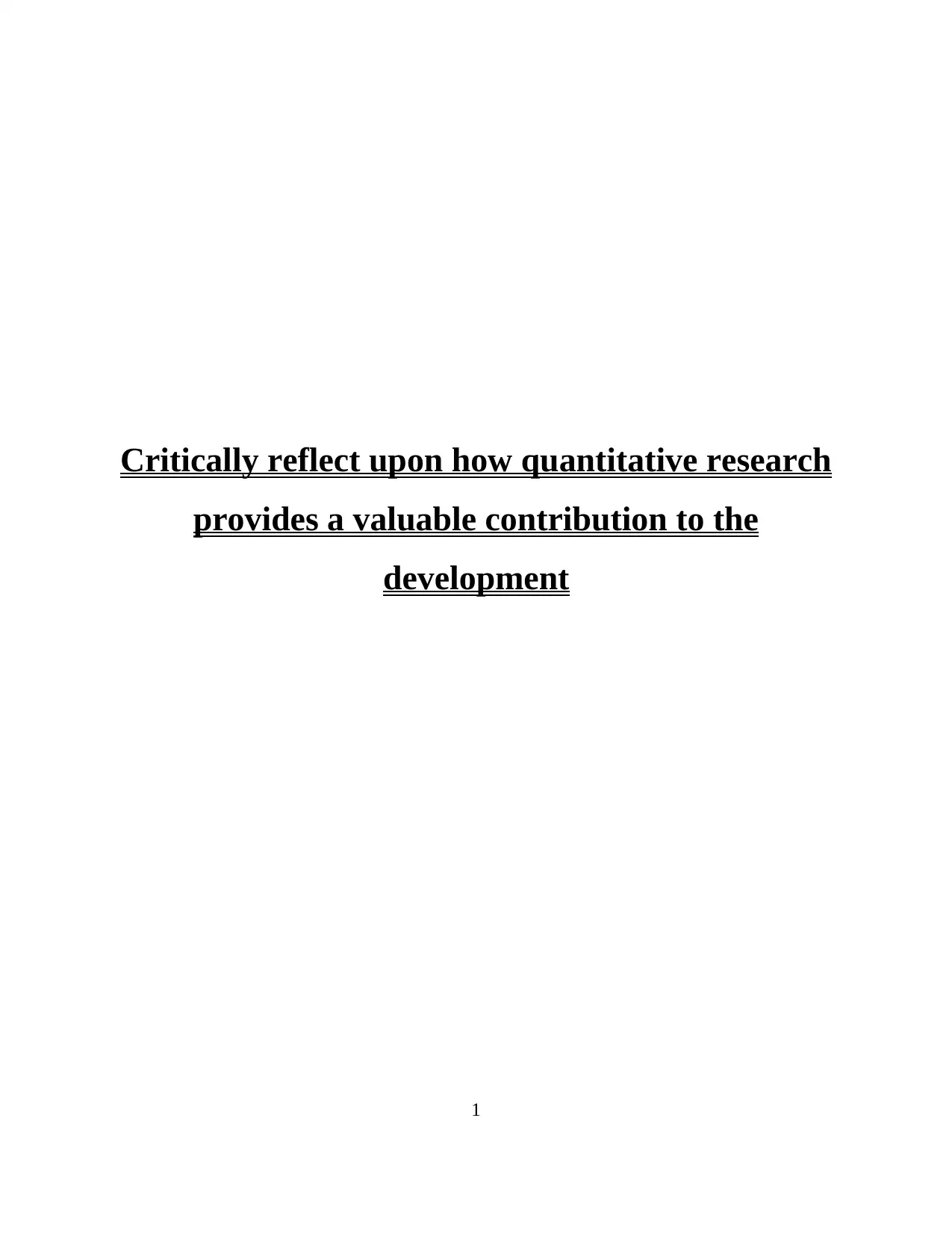
Critically reflect upon how quantitative research
provides a valuable contribution to the
development
1
provides a valuable contribution to the
development
1
Paraphrase This Document
Need a fresh take? Get an instant paraphrase of this document with our AI Paraphraser
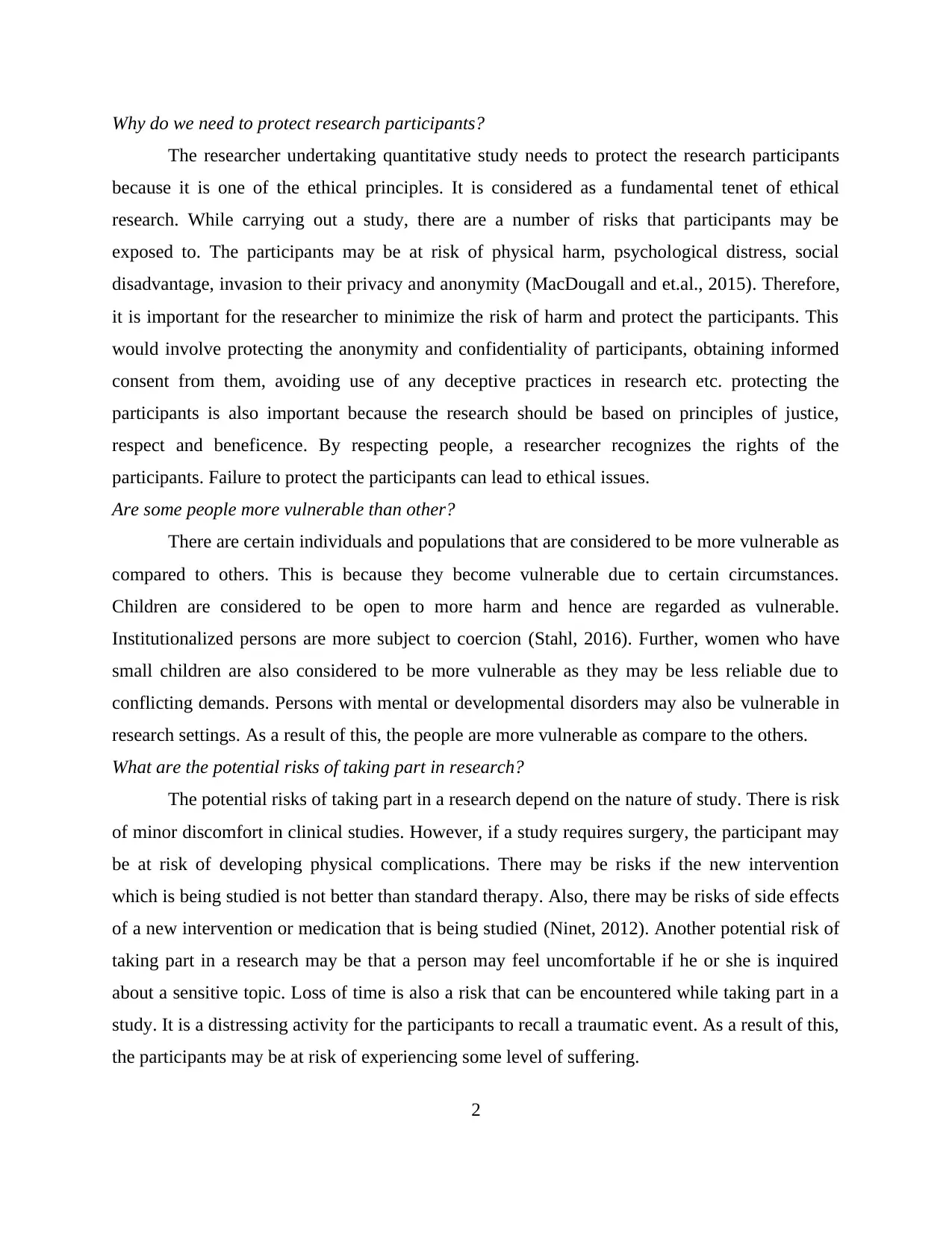
Why do we need to protect research participants?
The researcher undertaking quantitative study needs to protect the research participants
because it is one of the ethical principles. It is considered as a fundamental tenet of ethical
research. While carrying out a study, there are a number of risks that participants may be
exposed to. The participants may be at risk of physical harm, psychological distress, social
disadvantage, invasion to their privacy and anonymity (MacDougall and et.al., 2015). Therefore,
it is important for the researcher to minimize the risk of harm and protect the participants. This
would involve protecting the anonymity and confidentiality of participants, obtaining informed
consent from them, avoiding use of any deceptive practices in research etc. protecting the
participants is also important because the research should be based on principles of justice,
respect and beneficence. By respecting people, a researcher recognizes the rights of the
participants. Failure to protect the participants can lead to ethical issues.
Are some people more vulnerable than other?
There are certain individuals and populations that are considered to be more vulnerable as
compared to others. This is because they become vulnerable due to certain circumstances.
Children are considered to be open to more harm and hence are regarded as vulnerable.
Institutionalized persons are more subject to coercion (Stahl, 2016). Further, women who have
small children are also considered to be more vulnerable as they may be less reliable due to
conflicting demands. Persons with mental or developmental disorders may also be vulnerable in
research settings. As a result of this, the people are more vulnerable as compare to the others.
What are the potential risks of taking part in research?
The potential risks of taking part in a research depend on the nature of study. There is risk
of minor discomfort in clinical studies. However, if a study requires surgery, the participant may
be at risk of developing physical complications. There may be risks if the new intervention
which is being studied is not better than standard therapy. Also, there may be risks of side effects
of a new intervention or medication that is being studied (Ninet, 2012). Another potential risk of
taking part in a research may be that a person may feel uncomfortable if he or she is inquired
about a sensitive topic. Loss of time is also a risk that can be encountered while taking part in a
study. It is a distressing activity for the participants to recall a traumatic event. As a result of this,
the participants may be at risk of experiencing some level of suffering.
2
The researcher undertaking quantitative study needs to protect the research participants
because it is one of the ethical principles. It is considered as a fundamental tenet of ethical
research. While carrying out a study, there are a number of risks that participants may be
exposed to. The participants may be at risk of physical harm, psychological distress, social
disadvantage, invasion to their privacy and anonymity (MacDougall and et.al., 2015). Therefore,
it is important for the researcher to minimize the risk of harm and protect the participants. This
would involve protecting the anonymity and confidentiality of participants, obtaining informed
consent from them, avoiding use of any deceptive practices in research etc. protecting the
participants is also important because the research should be based on principles of justice,
respect and beneficence. By respecting people, a researcher recognizes the rights of the
participants. Failure to protect the participants can lead to ethical issues.
Are some people more vulnerable than other?
There are certain individuals and populations that are considered to be more vulnerable as
compared to others. This is because they become vulnerable due to certain circumstances.
Children are considered to be open to more harm and hence are regarded as vulnerable.
Institutionalized persons are more subject to coercion (Stahl, 2016). Further, women who have
small children are also considered to be more vulnerable as they may be less reliable due to
conflicting demands. Persons with mental or developmental disorders may also be vulnerable in
research settings. As a result of this, the people are more vulnerable as compare to the others.
What are the potential risks of taking part in research?
The potential risks of taking part in a research depend on the nature of study. There is risk
of minor discomfort in clinical studies. However, if a study requires surgery, the participant may
be at risk of developing physical complications. There may be risks if the new intervention
which is being studied is not better than standard therapy. Also, there may be risks of side effects
of a new intervention or medication that is being studied (Ninet, 2012). Another potential risk of
taking part in a research may be that a person may feel uncomfortable if he or she is inquired
about a sensitive topic. Loss of time is also a risk that can be encountered while taking part in a
study. It is a distressing activity for the participants to recall a traumatic event. As a result of this,
the participants may be at risk of experiencing some level of suffering.
2
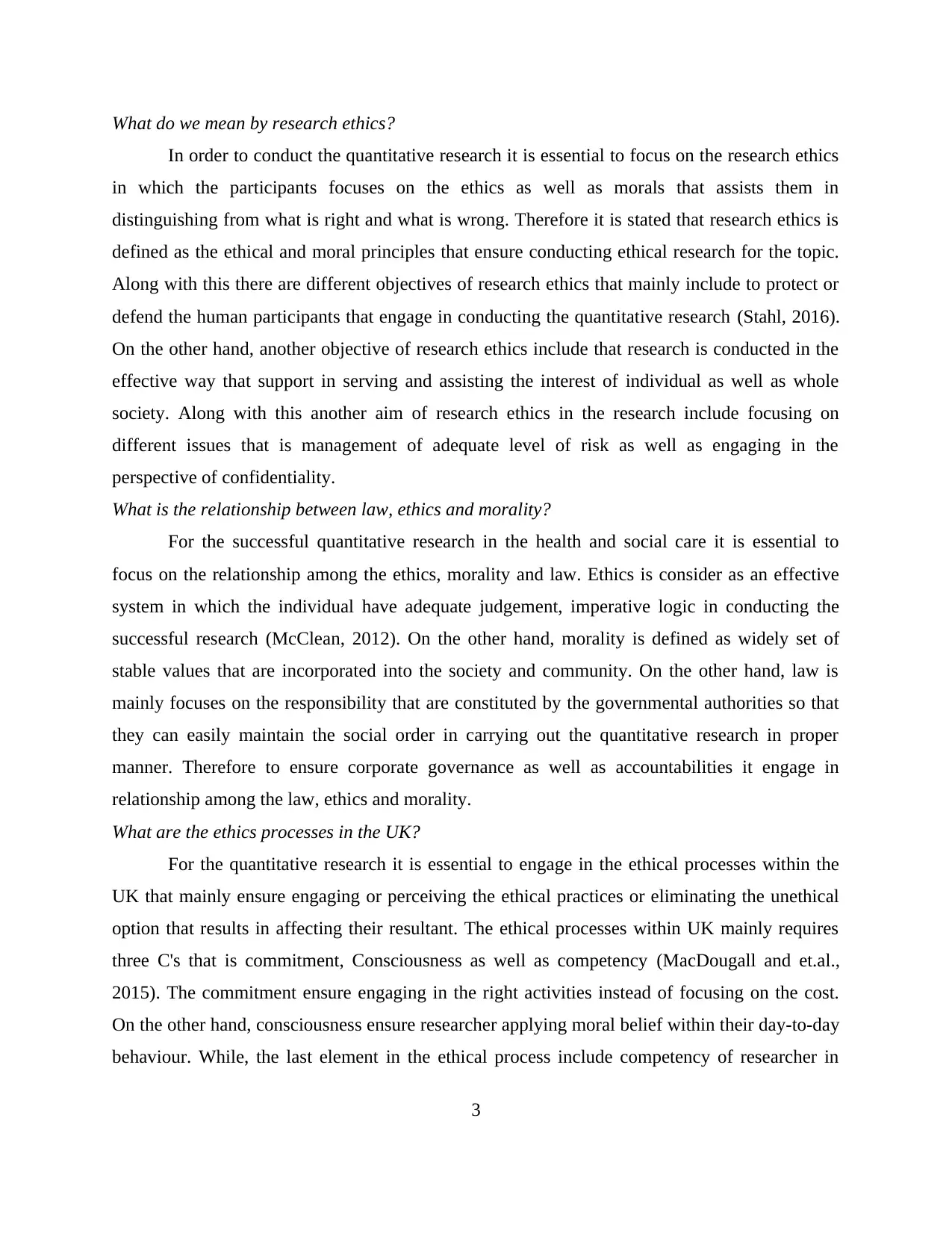
What do we mean by research ethics?
In order to conduct the quantitative research it is essential to focus on the research ethics
in which the participants focuses on the ethics as well as morals that assists them in
distinguishing from what is right and what is wrong. Therefore it is stated that research ethics is
defined as the ethical and moral principles that ensure conducting ethical research for the topic.
Along with this there are different objectives of research ethics that mainly include to protect or
defend the human participants that engage in conducting the quantitative research (Stahl, 2016).
On the other hand, another objective of research ethics include that research is conducted in the
effective way that support in serving and assisting the interest of individual as well as whole
society. Along with this another aim of research ethics in the research include focusing on
different issues that is management of adequate level of risk as well as engaging in the
perspective of confidentiality.
What is the relationship between law, ethics and morality?
For the successful quantitative research in the health and social care it is essential to
focus on the relationship among the ethics, morality and law. Ethics is consider as an effective
system in which the individual have adequate judgement, imperative logic in conducting the
successful research (McClean, 2012). On the other hand, morality is defined as widely set of
stable values that are incorporated into the society and community. On the other hand, law is
mainly focuses on the responsibility that are constituted by the governmental authorities so that
they can easily maintain the social order in carrying out the quantitative research in proper
manner. Therefore to ensure corporate governance as well as accountabilities it engage in
relationship among the law, ethics and morality.
What are the ethics processes in the UK?
For the quantitative research it is essential to engage in the ethical processes within the
UK that mainly ensure engaging or perceiving the ethical practices or eliminating the unethical
option that results in affecting their resultant. The ethical processes within UK mainly requires
three C's that is commitment, Consciousness as well as competency (MacDougall and et.al.,
2015). The commitment ensure engaging in the right activities instead of focusing on the cost.
On the other hand, consciousness ensure researcher applying moral belief within their day-to-day
behaviour. While, the last element in the ethical process include competency of researcher in
3
In order to conduct the quantitative research it is essential to focus on the research ethics
in which the participants focuses on the ethics as well as morals that assists them in
distinguishing from what is right and what is wrong. Therefore it is stated that research ethics is
defined as the ethical and moral principles that ensure conducting ethical research for the topic.
Along with this there are different objectives of research ethics that mainly include to protect or
defend the human participants that engage in conducting the quantitative research (Stahl, 2016).
On the other hand, another objective of research ethics include that research is conducted in the
effective way that support in serving and assisting the interest of individual as well as whole
society. Along with this another aim of research ethics in the research include focusing on
different issues that is management of adequate level of risk as well as engaging in the
perspective of confidentiality.
What is the relationship between law, ethics and morality?
For the successful quantitative research in the health and social care it is essential to
focus on the relationship among the ethics, morality and law. Ethics is consider as an effective
system in which the individual have adequate judgement, imperative logic in conducting the
successful research (McClean, 2012). On the other hand, morality is defined as widely set of
stable values that are incorporated into the society and community. On the other hand, law is
mainly focuses on the responsibility that are constituted by the governmental authorities so that
they can easily maintain the social order in carrying out the quantitative research in proper
manner. Therefore to ensure corporate governance as well as accountabilities it engage in
relationship among the law, ethics and morality.
What are the ethics processes in the UK?
For the quantitative research it is essential to engage in the ethical processes within the
UK that mainly ensure engaging or perceiving the ethical practices or eliminating the unethical
option that results in affecting their resultant. The ethical processes within UK mainly requires
three C's that is commitment, Consciousness as well as competency (MacDougall and et.al.,
2015). The commitment ensure engaging in the right activities instead of focusing on the cost.
On the other hand, consciousness ensure researcher applying moral belief within their day-to-day
behaviour. While, the last element in the ethical process include competency of researcher in
3
⊘ This is a preview!⊘
Do you want full access?
Subscribe today to unlock all pages.

Trusted by 1+ million students worldwide
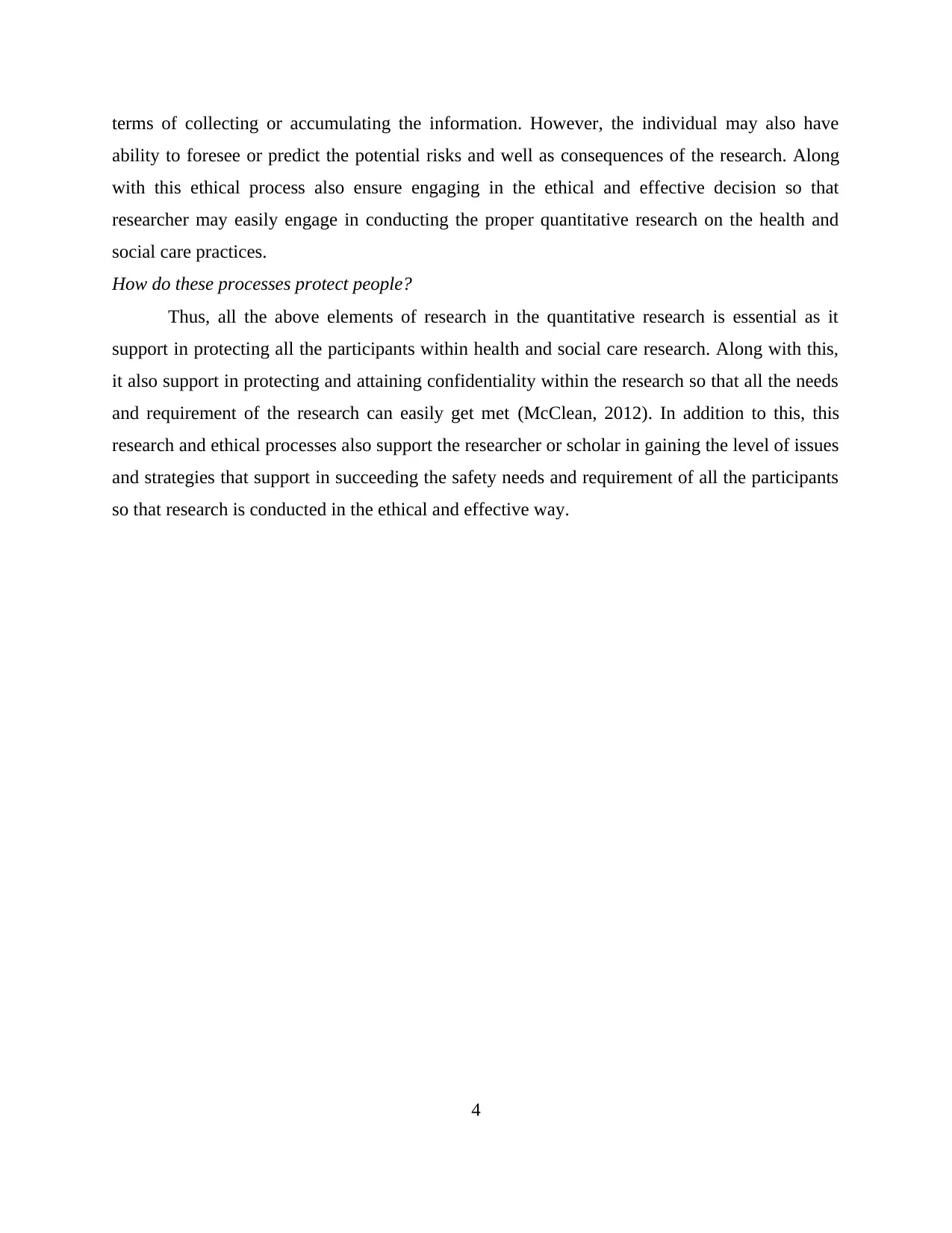
terms of collecting or accumulating the information. However, the individual may also have
ability to foresee or predict the potential risks and well as consequences of the research. Along
with this ethical process also ensure engaging in the ethical and effective decision so that
researcher may easily engage in conducting the proper quantitative research on the health and
social care practices.
How do these processes protect people?
Thus, all the above elements of research in the quantitative research is essential as it
support in protecting all the participants within health and social care research. Along with this,
it also support in protecting and attaining confidentiality within the research so that all the needs
and requirement of the research can easily get met (McClean, 2012). In addition to this, this
research and ethical processes also support the researcher or scholar in gaining the level of issues
and strategies that support in succeeding the safety needs and requirement of all the participants
so that research is conducted in the ethical and effective way.
4
ability to foresee or predict the potential risks and well as consequences of the research. Along
with this ethical process also ensure engaging in the ethical and effective decision so that
researcher may easily engage in conducting the proper quantitative research on the health and
social care practices.
How do these processes protect people?
Thus, all the above elements of research in the quantitative research is essential as it
support in protecting all the participants within health and social care research. Along with this,
it also support in protecting and attaining confidentiality within the research so that all the needs
and requirement of the research can easily get met (McClean, 2012). In addition to this, this
research and ethical processes also support the researcher or scholar in gaining the level of issues
and strategies that support in succeeding the safety needs and requirement of all the participants
so that research is conducted in the ethical and effective way.
4
Paraphrase This Document
Need a fresh take? Get an instant paraphrase of this document with our AI Paraphraser
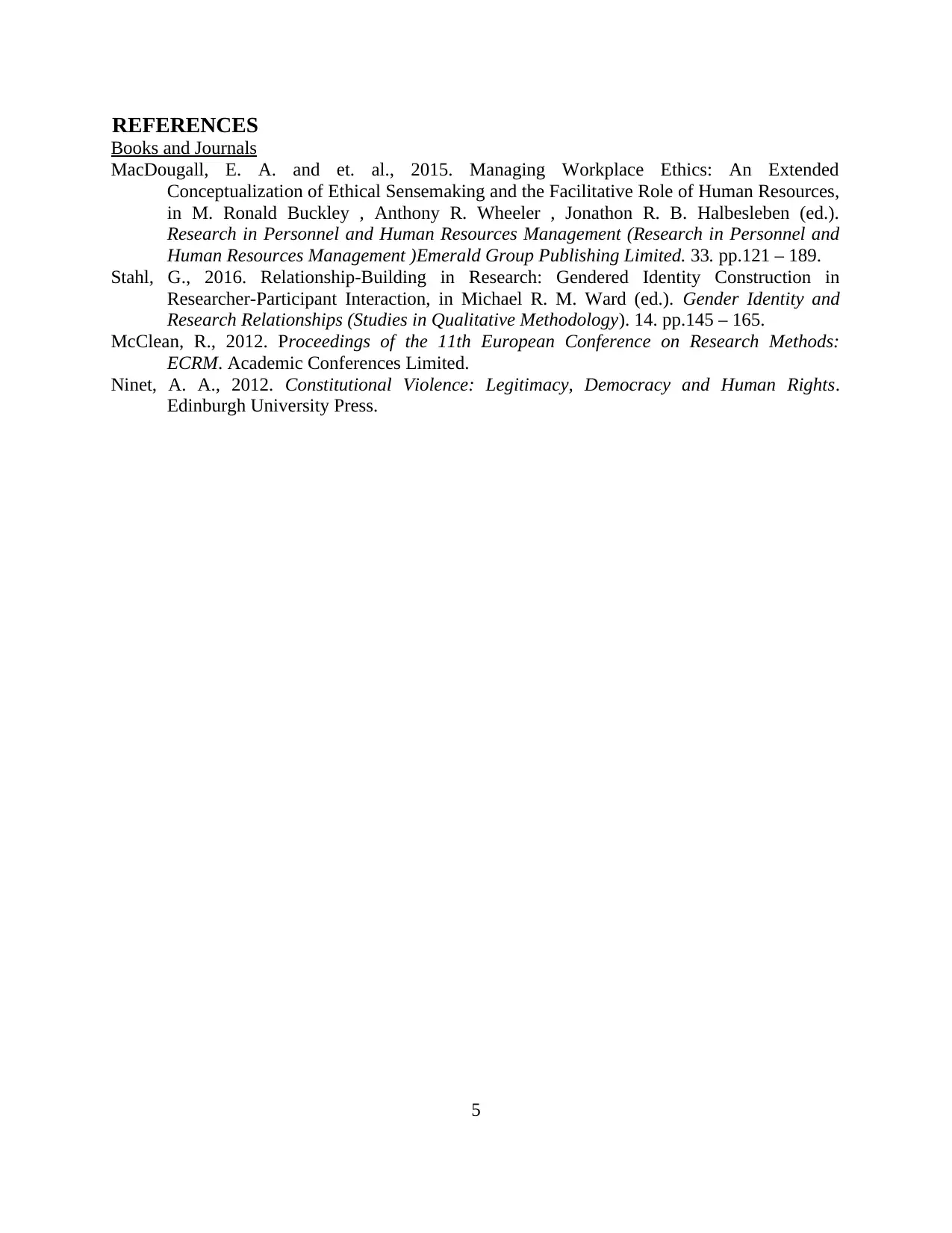
REFERENCES
Books and Journals
MacDougall, E. A. and et. al., 2015. Managing Workplace Ethics: An Extended
Conceptualization of Ethical Sensemaking and the Facilitative Role of Human Resources,
in M. Ronald Buckley , Anthony R. Wheeler , Jonathon R. B. Halbesleben (ed.).
Research in Personnel and Human Resources Management (Research in Personnel and
Human Resources Management )Emerald Group Publishing Limited. 33. pp.121 – 189.
Stahl, G., 2016. Relationship-Building in Research: Gendered Identity Construction in
Researcher-Participant Interaction, in Michael R. M. Ward (ed.). Gender Identity and
Research Relationships (Studies in Qualitative Methodology). 14. pp.145 – 165.
McClean, R., 2012. Proceedings of the 11th European Conference on Research Methods:
ECRM. Academic Conferences Limited.
Ninet, A. A., 2012. Constitutional Violence: Legitimacy, Democracy and Human Rights.
Edinburgh University Press.
5
Books and Journals
MacDougall, E. A. and et. al., 2015. Managing Workplace Ethics: An Extended
Conceptualization of Ethical Sensemaking and the Facilitative Role of Human Resources,
in M. Ronald Buckley , Anthony R. Wheeler , Jonathon R. B. Halbesleben (ed.).
Research in Personnel and Human Resources Management (Research in Personnel and
Human Resources Management )Emerald Group Publishing Limited. 33. pp.121 – 189.
Stahl, G., 2016. Relationship-Building in Research: Gendered Identity Construction in
Researcher-Participant Interaction, in Michael R. M. Ward (ed.). Gender Identity and
Research Relationships (Studies in Qualitative Methodology). 14. pp.145 – 165.
McClean, R., 2012. Proceedings of the 11th European Conference on Research Methods:
ECRM. Academic Conferences Limited.
Ninet, A. A., 2012. Constitutional Violence: Legitimacy, Democracy and Human Rights.
Edinburgh University Press.
5
1 out of 5
Related Documents
Your All-in-One AI-Powered Toolkit for Academic Success.
+13062052269
info@desklib.com
Available 24*7 on WhatsApp / Email
![[object Object]](/_next/static/media/star-bottom.7253800d.svg)
Unlock your academic potential
Copyright © 2020–2026 A2Z Services. All Rights Reserved. Developed and managed by ZUCOL.





